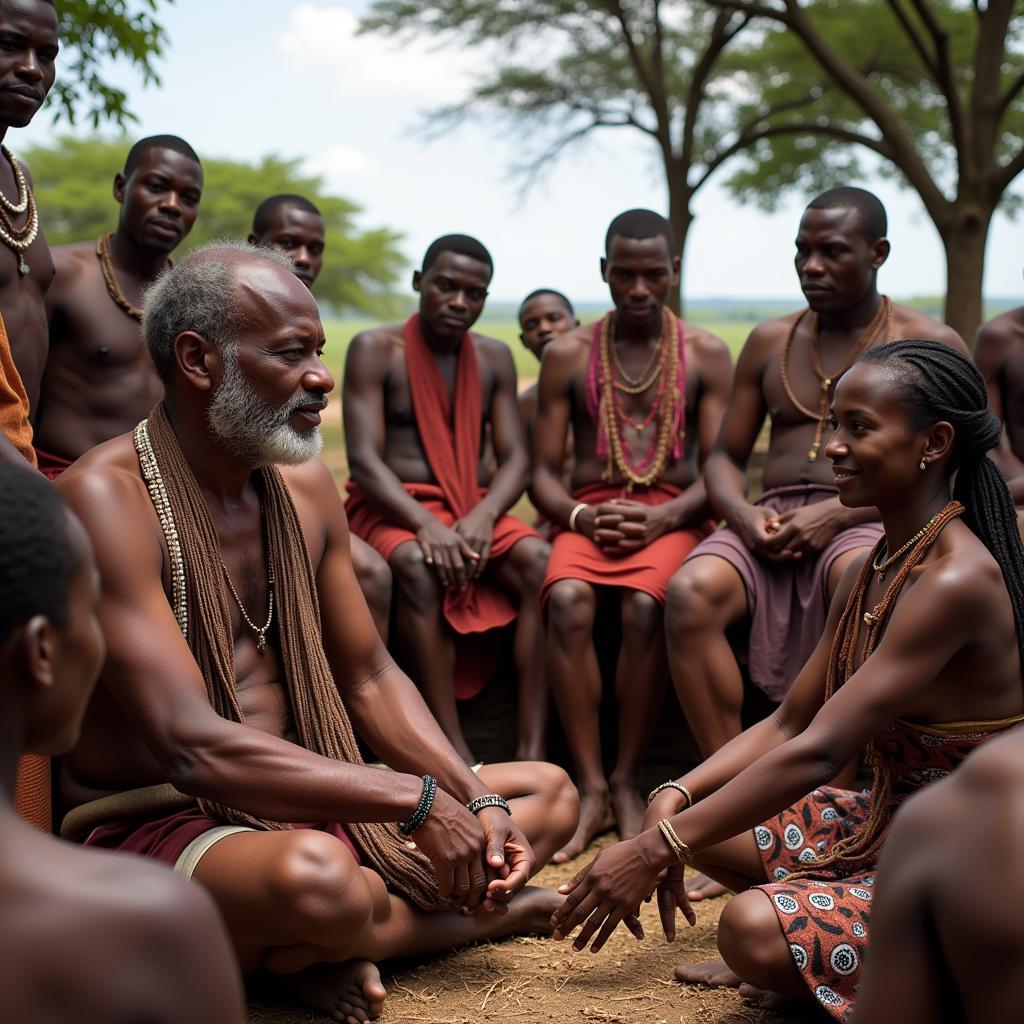Informal disputes are a common occurrence in band societies, which are small-scale, nomadic groups of hunter-gatherers with flexible social structures. While these societies often emphasize cooperation and shared resources, conflicts inevitably arise due to factors like resource scarcity, personal disagreements, or violations of social norms.
These disputes are typically resolved through informal mechanisms that prioritize social harmony and maintaining group cohesion. This article delves into the various ways informal disputes in band societies may be resolved, examining the underlying principles, common practices, and cultural nuances that shape conflict resolution in these unique social settings.
Understanding the Dynamics of Conflict in Band Societies
Band societies, characterized by their small size and close-knit relationships, often rely on informal methods to resolve disputes. These methods are deeply embedded in their cultural values and traditions, reflecting a strong emphasis on maintaining social order and preserving group solidarity.
Factors Contributing to Disputes
Several factors can contribute to the emergence of disputes in band societies:
- Resource Scarcity: In environments with limited resources, competition for food, water, or other necessities can lead to tension and conflict.
- Personal Disagreements: Disputes may stem from personal grievances, misunderstandings, or disagreements over social etiquette or roles.
- Violations of Social Norms: Band societies have strong social norms and expectations regarding behavior, and violations of these norms can trigger conflict.
- External Threats: Conflicts can arise from interactions with neighboring groups, particularly in situations of resource competition or territorial disputes.
Common Practices in Informal Dispute Resolution
Band societies employ a variety of strategies to resolve disputes, often involving:
- Mediation and Negotiation: Disputes are frequently resolved through mediation, where a respected member of the group facilitates dialogue and seeks a compromise.
- Social Shaming: Public shaming, where individuals are publicly criticized for their actions, can serve as a deterrent to future transgressions.
- Ritualized Reconciliation: Many band societies have elaborate rituals designed to restore harmony and mend broken relationships after a dispute.
- Blood Feuds: In some cases, disputes may escalate into blood feuds, involving retaliatory violence between families or groups.
Cultural Nuances and Variations
The specific methods of dispute resolution vary across different band societies, influenced by factors such as:
- Cultural Values: The emphasis on cooperation, social harmony, and group cohesion shapes how conflicts are addressed.
- Social Structure: The degree of social stratification and the distribution of power within the group influence the dynamics of conflict resolution.
- Environmental Conditions: The availability of resources and the nature of the environment can impact the frequency and severity of disputes.
Example: The !Kung People of the Kalahari Desert
“The !Kung people prioritize cooperation and harmony in their daily lives, and conflict resolution is seen as a vital part of maintaining social cohesion. When disputes arise, they often utilize a combination of mediation, social shaming, and reconciliation rituals to restore peace and prevent further conflict.” – Dr. Amelia Green, Anthropologist
The !Kung, an indigenous group residing in the Kalahari Desert, provide a compelling example of how band societies address disputes. They emphasize cooperation, resource sharing, and collective decision-making. When disputes arise, they often involve mediation by respected elders or individuals who can facilitate communication and reconciliation.
 The !Kung People Engaging in a Mediation Ritual
The !Kung People Engaging in a Mediation Ritual
Addressing the Challenges of Informal Dispute Resolution
Informal dispute resolution methods in band societies are not without their challenges:
- Bias: Mediators or individuals involved in resolving disputes may harbor personal biases, potentially impacting the outcome.
- Lack of Formal Structure: The absence of a formal legal system can make it challenging to ensure fairness and accountability in dispute resolution.
- Escalation: Disputes may escalate into violence if informal mechanisms fail to resolve the conflict adequately.
Conclusion: Building a More Peaceful Future
Understanding informal dispute resolution methods in band societies offers insights into the importance of social harmony, cultural values, and community cohesion in navigating conflict. These practices highlight the resilience of small-scale societies and their ability to adapt and find solutions in the face of challenges.
 A Band Society Community Gathering for Conflict Resolution
A Band Society Community Gathering for Conflict Resolution
By learning from these traditional methods, we can cultivate a deeper understanding of how to promote peaceful and inclusive communities in today’s complex world. As global society faces increasing challenges related to conflict and division, insights from band societies offer valuable lessons in promoting dialogue, understanding, and reconciliation.
FAQ
- What are some common examples of informal disputes in band societies?
Informal disputes in band societies can range from minor disagreements about food sharing to more serious conflicts over resource access, personal relationships, or violations of social norms.
- How do band societies ensure fairness in dispute resolution?
While there isn’t a formal legal system, band societies often rely on social pressure and community involvement to ensure a degree of fairness in dispute resolution. The emphasis on consensus and social harmony often encourages parties to reach a compromise that is deemed acceptable by the group.
- How have informal dispute resolution practices evolved over time?
While traditional practices remain relevant, band societies have adapted their conflict resolution methods in response to external pressures and modern influences. For instance, some groups have adopted elements of formal legal systems or incorporated new forms of mediation and communication technologies.
- What lessons can we learn from band societies about conflict resolution?
Band societies demonstrate the importance of dialogue, understanding, and building relationships to navigate conflict effectively. Their emphasis on community cohesion, shared responsibility, and seeking solutions through consensus can be valuable lessons for resolving conflicts in modern societies.
- What is the role of cultural values in resolving disputes?
Cultural values play a crucial role in shaping the approaches to dispute resolution in band societies. Values like cooperation, harmony, and respect for elders are often reflected in the practices and principles guiding their conflict resolution processes.
- What are some challenges to informal dispute resolution in band societies?
Informal dispute resolution practices can be subject to biases, lack of formal structure, and potential escalation of conflict if not addressed effectively. The absence of a formal legal system can also make it challenging to hold individuals accountable for their actions.
- How can we promote peaceful and inclusive communities in a globalized world?
By learning from the practices of band societies, we can promote dialogue, understanding, and reconciliation in diverse communities. Embracing inclusive values, promoting respect for cultural differences, and developing effective conflict resolution strategies can contribute to a more peaceful and just world.